Bhau-beej
|
|
|
|---|---|

Tilak of 7 colors is applied on the forehead
|
|
| Also called | Bhau Beej, Bhai Tika, Bhai Phonta |
| Observed by | Hindus |
| Type | Religious, India, Nepal |
| Significance | Public holiday in Nepal |
| Date | Kartika Shukla Dwitiya |
| 2016 date | 1 November |
| 2017 date | 21 October |
| Frequency | Annual |
Bhai Dooj(भाई दूज) / Bhau-Beej / Bhai Tika / Bhai Phonta(ভাইফোঁটা) is a festival celebrated by Hindus of India and Nepal on the second lunar day of Shukla Paksha (bright fortnight) in the Vikram Samvat Hindu calendar month of Kartika. It is the last day of the five-day-long Diwali or Tihar festival.
The celebrations of this day are similar to the festival of Raksha Bandhan. On this day, sisters get gifts from brothers.
In the southern part of the country, the day is celebrated as Yama Dwitiya.
The festival is known as:
According to a popular legend in Hindu mythology, after slaying the evil demon Narkasur, Lord Krishna visited his sister Subhadra who gave him a warm welcome with sweets and flowers. She also affectionately applied tilak on Krishna's forehead. Some believe this to be the origin of the festival.
On the day of the festival, sisters invite their brothers for a sumptuous meal often including their favorite dishes/sweets. The procedure may be different in bihar and central india. The whole ceremony signifies the duty of a brother to protect his sister, as well as a sister's blessings for her brother.
Carrying forward the ceremony in traditional style, sisters perform aarti for their brother and apply a red tika on the brother's forehead. This tika ceremony on the occasion of Bhai Bij signifies the sister's sincerest prayers for the long and happy life of her brother and treat them with gifts. In return brothers bless their sisters and may treat them also with gifts or cash.
As it is customary in Haryana, Maharashtra to celebrate the auspicious occasion of Bhau-beej, women who do not have a brother worship the moon god instead. They apply mehendi on girls as their tradition.
...
Wikipedia
